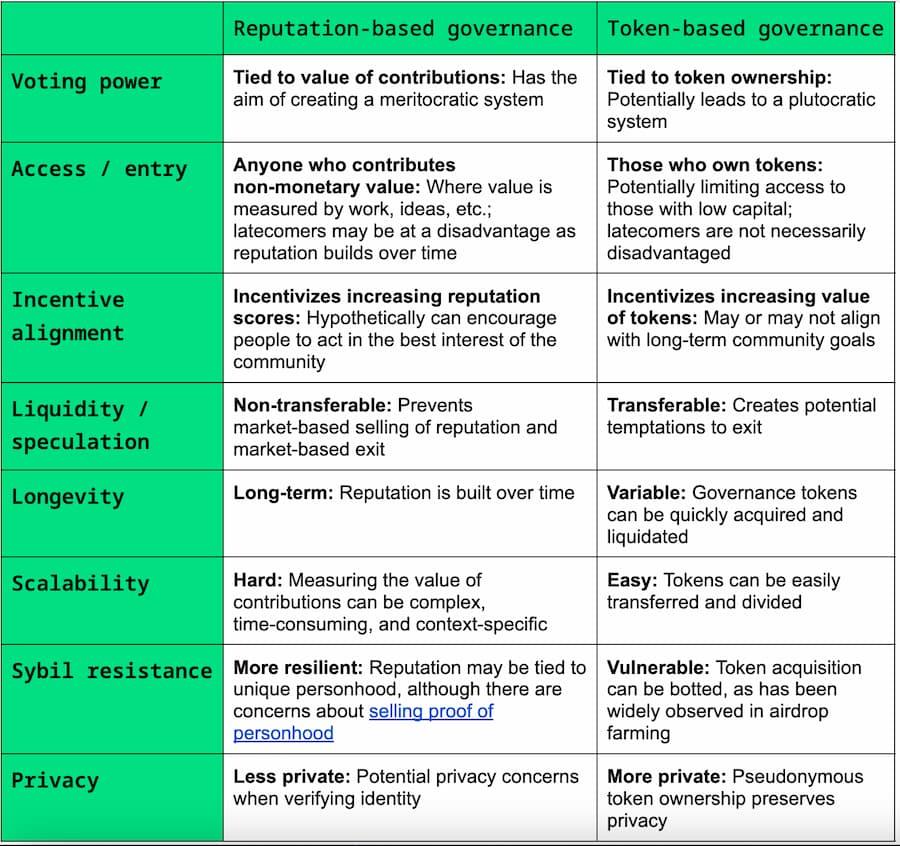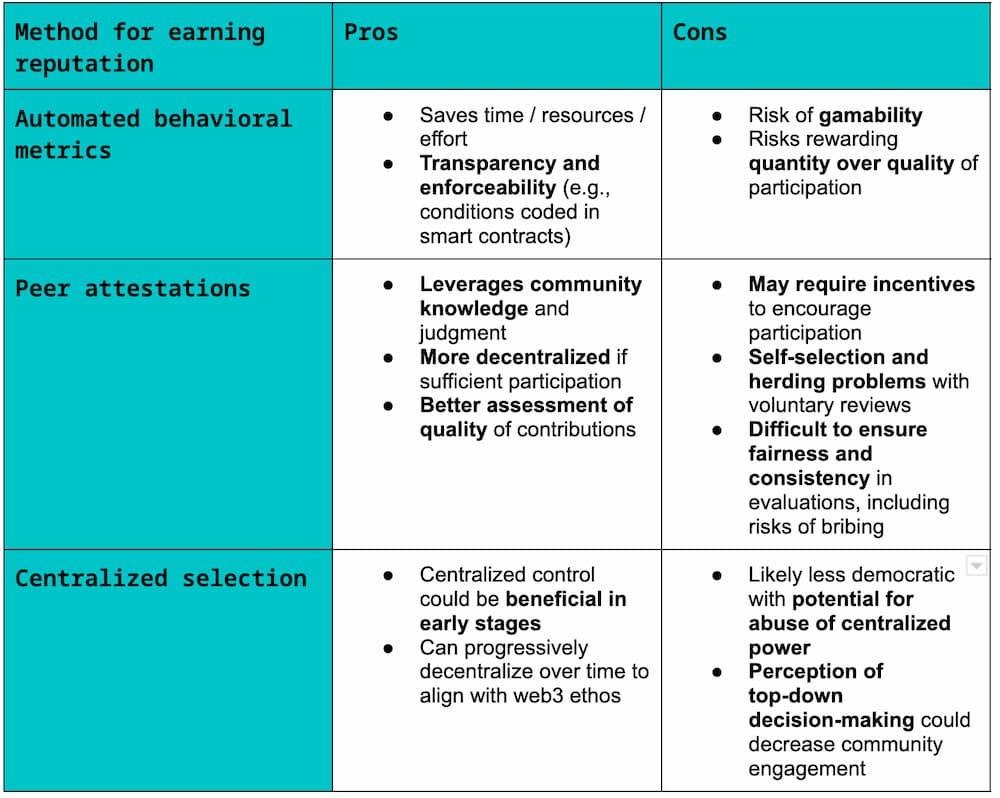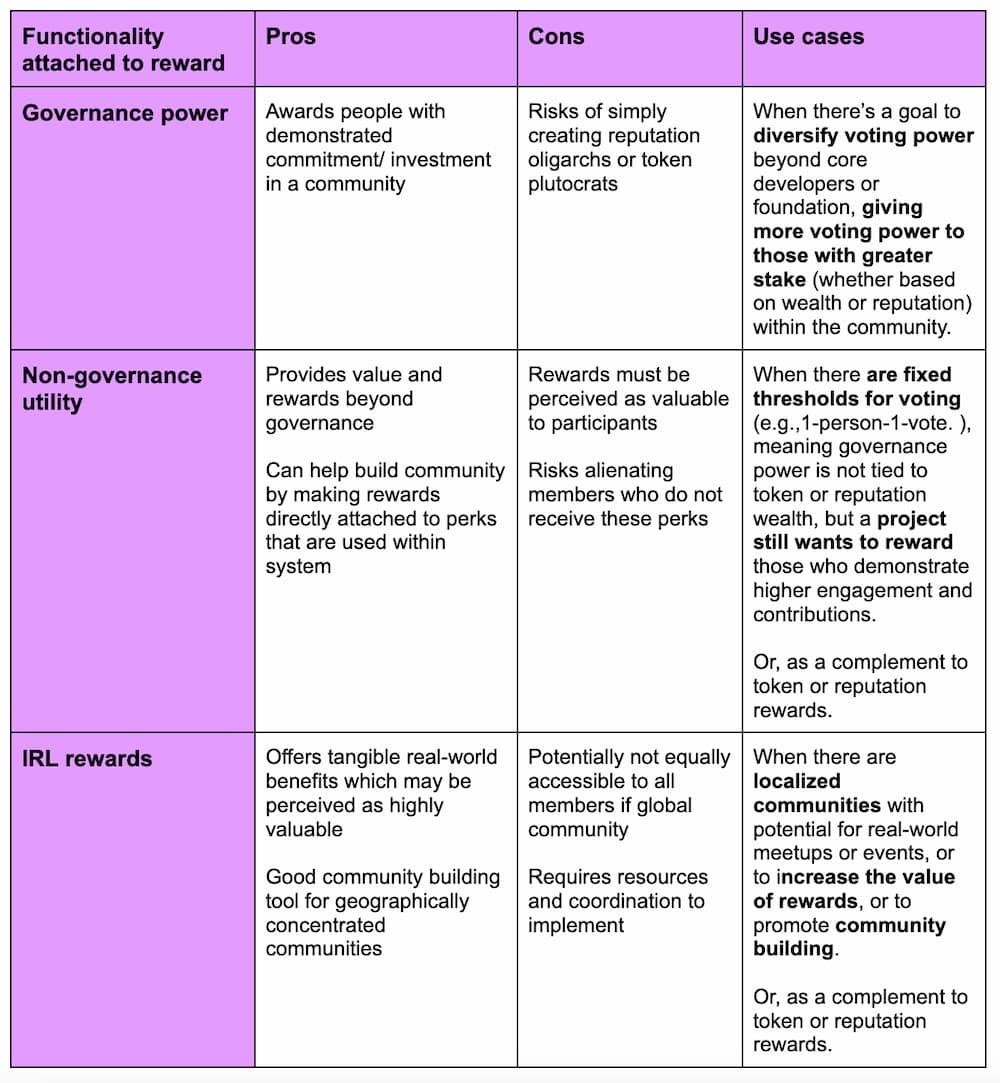This article will compare governance reward systems based on reputation and token-based participation, outlining the considerations for each governance reward system.
Author: Eliza Oak, a16z
Translator: Karen, Foresight News
A core challenge of democratized online governance systems is how to incentivize long-term citizen participation through rewards.
Current Web3 governance systems often use transferable tokens, but these tokens have some obvious limitations (e.g., tendency towards oligarchic rule, low resistance to Sybil attacks, and incentivizing token holders to sell tokens and exit), which can be overcome by transcending token voting.
In this article, I compare governance reward systems based on reputation and token-based participation, outline the considerations for each governance reward system, and discuss how to earn these rewards and how they might translate into what power.
Precedents for Rewarding Contributions
Political influence is often based on wealth rather than merit
Historically, social and political influence has largely been based on wealth rather than merit. For example, in ancient Rome, the status of the senatorial class was distinguished by birth and land ownership.
During the Renaissance, wealthy families such as the Medici bankers in Florence used their wealth to influence political and religious affairs as well as cultural movements.
Even in many modern liberal democratic countries, wealthy individuals and companies also influence political affairs through donations and lobbying. Other social systems explicitly designed to reward merit, such as university admissions, often reward wealth and connections through legacy admissions or alumni donations.
If the goal of Web3 is to move towards a truly democratic online system, the question becomes how we can prevent the re-creation of a wealth-based hierarchy. How can we prioritize virtues, values, and contributions over wealth and connections?
Performance-based reputation systems are difficult to extend beyond niche environments
Reputation is a way society attempts to capture merit.
For centuries, we have been trying to find ways to collect and aggregate signals to identify who is trustworthy, capable, or deserving of recognition, and then determine how to translate these signals into social status, access, and decision-making power.
For example, medieval European guilds demonstrated the craftsmanship of artisans; enjoyed a reputation in close-knit tribal communities; academic accreditation from universities; and the use of credit ratings to assess the likelihood of someone defaulting on financial obligations.
In addition, in today's digital environment, technology platforms have explored some reputation identification methods based on observed behavior rather than wealth. For example, Google's PageRank algorithm, Reddit's reputation scores, and peer reviews on Amazon and Yelp. However, these systems are often less associated with wealth and connections, but are often limited to specific environments and cannot be extended to broader fields. In addition, they are also susceptible to fraud and abuse.
Of course, large-scale reward systems are not without significant social risks. The key is to balance the power of technology with the goal of decentralized design.
Web3 provides possibilities for performance-based online governance
For the first time in history, Web3 enables us to design and implement highly trusted, widely available reward systems.
For example, the immutability of blockchain ensures that rewards are tamper-proof and securely recorded, while smart contracts can transparently automate the implementation of rewards, reducing the need for intermediaries.
The delegate compensation system of MakerDAO is an example of exploring reward systems in Web3, and I will discuss other examples later in this article.
These reward systems are based on new mechanisms for building trust and distributing rewards, and may be designed based on the participation of a broad user base to democratize the governance processes of entire technology platforms or other online communities.
Two Core Challenges in Designing Reward Structures
Two important questions in designing reward systems are:
What should be rewarded?
Who receives the rewards?
What should be rewarded?
Models such as university credentials or skill certificates, or credit ratings, represent rough models of credibility, contribution, and skill value. The key to determining the content of rewards is to determine whether this truly reflects reputation.
For example, in online governance, users may receive reputation scores for actions such as voting, participating in town hall meetings, or submitting governance proposals. So, besides recording the frequency (quantity) of doing these things, is there a way to evaluate the effort and value (quality) of these actions?
Who receives the rewards?
The core of determining who receives the rewards is aggregation, where the tricky part is creating a standardized method and explaining it in common language.
In terms of reputation, the metrics are usually specific to the situation: for example, credit scores reflect financial credibility, driving records measure driving responsibility, and online reviews assess restaurant cooking skills.
These metrics do not necessarily mean they can be interchangeable; for example, an excellent credit score does not guarantee a person's cooking ability. But in using reputation-based governance in online communities, incorporating more inclusive views of reputation may be meaningful.
So how do we balance these different components of reputation and make them adaptable to a broader social environment? Should the design of reputation include everything in someone's encrypted wallet, including finances, identity, and even virtual artwork and property?
Reputation System vs Token-based System
Token-based rewards are transferable, while reputation-based rewards are not. People may wonder which one to use and why.
Early experiments in Web3 governance were often token-based, but there is currently a trend towards defaulting to more reputation-based systems, as they would have clear advantages if successfully implemented (summarized in the table below).

Overall, reputation-based governance may be reasonable for prioritizing long-term community consistency, while token-based governance may be more suitable for prioritizing scalability and liquidity projects. In terms of access/participation, reputation-based systems may be more inclined towards early community members, who can build reputation earlier, although token-based systems may be more suitable for wealthy individuals. In terms of resisting Sybil attacks, reputation-based systems aim to overcome inherent Sybil vulnerabilities in token-based systems by associating reputation with identity (e.g., Beanstalk hack attacks). However, this may raise privacy concerns, depending on the methods used to verify identity, although these concerns can be overcome by zk-SNARKS or other types of zero-knowledge proofs.
In practice, some combination of tokens and reputation scores may be a reasonable approach. Optimism's "bicameralism," which includes a reputation-based Citizen House and a token-based Token House, would be one implementation, but there is a lot of design space. Past research suggests that reputation systems should rely on a pair of tokens, one for representing reputation and the other for providing liquidity. Other projects are exploring dual governance models, where staked token holders have veto power over governance token holders. In the case of Lido, both LDO and stETH tokens are transferable, although it is conceivable to build non-transferable reputation-based governance tokens into a similar dual-token model.
Token-based Systems
"Token-based governance" refers to a system in which incentives or rewards are associated with the ownership or acquisition of fungible tokens. For example, Uniswap's UNI token can be used to vote in Uniswap governance.
Compared to reputation-based systems, the transferability of these tokens makes it easier for new participants to engage in protocol governance, although these systems may potentially lead to oligarchic rule, where those with more capital have greater influence. Token holders have a direct financial interest in the success of the project, which incentivizes them to vote to promote their long-term financial value.
Unfortunately, the financial interests of token holders are not always aligned with the long-term non-financial community interests. Examples of these types of tokens include Ethereum ERC-20 tokens, Cosmos ICS-20 tokens, and Solana SPL tokens.
Currently, most projects use a "one coin, one vote" model to vote on decisions related to the project. For example, in MakerDAO, MKR token holders can vote on protocol changes to support risk parameters for collateral backing the DAI stablecoin. In the decentralized lending protocol Aave, AAVE token holders can vote on which projects should receive funds from the Aave ecosystem reserves. In the decentralized exchange Uniswap, UNI token holders voted on changes to the fee structure of the UNI token, which would affect the allocation of trading fees between liquidity providers and token holders.
In token-based systems, some implemented examples of reward mechanisms for distributing transferable tokens include:
Airdrops: Tokens are distributed to wallets at discrete time points based on specific eligibility criteria. Airdrops are often used to incentivize certain behaviors, promote new projects, or distribute ownership more widely within the community. DeFi protocols (such as Uniswap), Layer2 solutions (such as Optimism), blockchain identity solutions (such as ENS), and even NFT projects (such as Yuga Labs' Bored Ape Yacht Club) have all attempted airdrop rewards.
Retrospective rewards: Optimism has implemented multiple rounds of retrospective rewards to distribute tokens, sending OP tokens to users' wallets whose contributions supported the development and adoption of Optimism public goods to build a broader OP Stack ecosystem. Examples of public goods include adding code to the developer ecosystem, contributions to user experience and adoption, or active participation in Optimism governance. Winners are selected through community nominations and voting in the Optimism Citizen’s House.
Liquidity mining: Users earn token rewards by providing liquidity to decentralized exchanges or liquidity pools. Examples of protocols issuing token rewards through liquidity mining are the decentralized lending protocol Compound Finance and the derivative liquidity protocol Synthetix. Compared to airdrops implemented at discrete times or multiple times, liquidity mining continuously sends tokens to users for lending. This is similar to anonymous mining in Tornado Cash, where users earn token rewards by depositing tokens into an anonymous pool.
Voting delegation: To participate in governance, users must lock their tokens in a voting delegation. Users can increase their voting power by locking tokens for a longer period. For example, the DeFi exchange Curve Finance uses veCRV (voting delegation CRV token) for voting delegation. In Curve, the longer the veCRV is locked, the greater the boost in addition to increasing voting power. This can also serve as a defense mechanism against governance attacks based on flash loans.
Reputation-based Systems
Reputation is earned, not purchased. While reputation can also take the form of tokens, its implementation differs from fungible tokens that can be bought or sold on the open market. In practice, reputation is most commonly leveraged using non-fungible tokens (NFTs), such as the ERC-5114 (Soulbound Badges) token in Ethereum. Examples of current identity-based governance systems include the badges from Optimism Citizen’s House and the reputation-based voting proposed by Polygon through Polygon ID. Reputation-based governance may operate in various ways in practice, including peer attestations, automatic scoring based on observable behavior, or centralized selection (I outline the trade-offs between different reward mechanisms later in this article).
Assuming reputation tokens can take the form of non-transferable fungible tokens (e.g., if the transfer function is disabled in an ERC-20 contract), non-transferable fungible tokens could be used to rate the contributions of community members in a more granular way.
These reputation-based governance systems may distribute influence more fairly and potentially provide better resistance to sybil attacks. However, reputation-based systems do have inherent challenges, such as scalability and subjective measurement of contributions.
Reputation-based governance rewards are still in the early stages of implementation. Some potential methods for earning reputation include:
Automatic behavior metrics: Reputation is automatically calculated based on observable actions by users in the system. For example, if someone attends a town hall, their reputation score might earn one point, while voting might earn 5 points. These behavioral metrics may be hardcoded into smart contracts.
Peer attestations: Reputation is established through recognition or assessment by other participants. This method uses peer reviews to go beyond observable behavior, which may better evaluate the quality of participation but requires incentivizing people to spend time rating peers. A key challenge here is preventing bribery or other forms of reputation purchasing. An example of peer attestations in practice is the collaboration between Boys Club DAO and Govrn, allowing members to record DAO contributions that can be attested by other community members and eventually converted into retrospective rewards. Another example is contribution-based attestations to enhance governance accessibility, as proposed by the Optimism governance forum, which may use Ethereum Attestation Services (EAS) or something similar to create, verify, and revoke attestations.
Centralized selection: In the early stages of a project, a dedicated team manually selects individuals and assigns high reputation scores based on set criteria. As the system develops, decentralization can gradually be achieved, allowing a broader community to play a greater role in refining reputation standards. This approach aims to strike a balance between quality assurance in the initial stages and full decentralization of governance. Vitalik Buterin mentioned this model in a blog post in August 2021, noting that "the simplest solution might be to bootstrap the system by manually selecting 10-100 early contributors, and then as the system develops, gradually decentralize by having each round of selected participants determine the criteria for the next round."
Because reputation systems are not simply purchased on the open market, there is a wide design space for how to earn reputation rewards. The table below summarizes the pros and cons of different ways ecosystem participants earn reputation:

What Power Do Rewards Have?
In addition to determining how rewards are allocated, a key question is to determine the value, access, privileges, or influence that rewards bring. Currently, most Web3 governance systems use transferable tokens, which can be converted into voting rights, where one token equals one vote.
Different types of value can be combined with rewards. Whether rewards are transferable (token-based systems) or non-transferable (reputation-based systems) also affects the meaning of these decisions, but at a higher level, these powers can be combined with transferable or non-transferable reputation.
What Form Do Rewards Take?
Governance power: Rewards directly translate into the ability to vote, delegate, propose, or perform other governance functions.
Non-governance utility: Rewards directly translate into non-governance utility within the online system. This may include special access to community groups and events, priority access to staking, special avatars, or community status symbols, among others.
IRL rewards: Rewards directly translate into real-life (IRL) benefits, such as attending official events (e.g., gatherings, workshops, webinars) with community members, physical gifts, or other non-digital consumables.
Successful reward structures are likely to involve a mix-and-match mechanism tailored to the nature and goals of the project, and governance rewards may correspond to different combinations of governance power, non-governance utility, or real-life benefits.

Issues to Consider When Designing Online Governance Reward Systems
In reviewing the factors to consider when designing online governance reward systems, various considerations need to be balanced. The project's answers to these questions will impact whether its reward system should be adjusted based on reputation or tokens.
How to collect information and aggregate it into rewards?
How rewards translate, aiming for interoperability of rewards (e.g., reputation scores) across different ecosystems (e.g., cross-chain interactions)?
Is the plan for reward design to be driven by intermediaries or primarily based on decentralized interactions?
Is it desired for rewards to be linked to real-world identities or anonymous accounts?
Is sybil resistance crucial for the project and the reward mechanism?
Is there a plan to combine reputation tokens with transferable tokens?
For a project, whether to use token-based governance depends on whether the project is civic or economic. As I outlined earlier, there are trade-offs on specific dimensions (such as scalability, access, privacy, Byzantine resistance, etc.). While there are arguments for token voting (e.g., stakeholder participation), a common concern with token-based governance systems is the potential issue of oligarchy, where wealthy participants wield disproportionate influence, which clearly goes against the ethos of Web3.
Reputation systems aim to tie governance or other powers to the reputation individuals earn within the community. However, non-transferable reputation systems are challenging to implement due to the complexity of measuring and verifying reputation.
Therefore, exploring reputation-based governance and other ways beyond token-based voting is an open and potentially fruitful area for decentralized governance.
I have outlined some considerations regarding the implementation of reputation systems, but this is an evolving field, and I look forward to further discussions and experimentation to design effective online democratic governance systems.
免责声明:本文章仅代表作者个人观点,不代表本平台的立场和观点。本文章仅供信息分享,不构成对任何人的任何投资建议。用户与作者之间的任何争议,与本平台无关。如网页中刊载的文章或图片涉及侵权,请提供相关的权利证明和身份证明发送邮件到support@aicoin.com,本平台相关工作人员将会进行核查。




